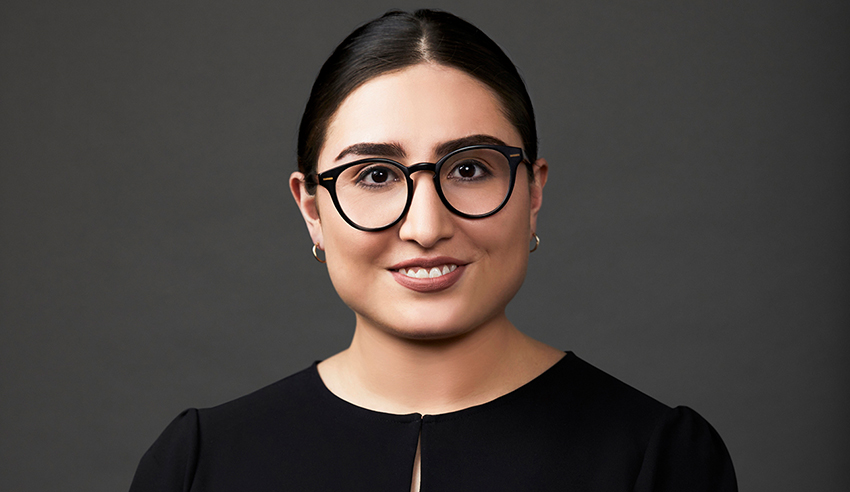Whilst maintaining a balance is important, putting yourself forward for extracurriculars can shape the type of practitioner you become, said this lawyer and Golden Gavel champion.

Olivia Irvine is a lawyer at Hazelbrook Legal, as well as a two-time winner of the Golden Gavel Competition in NSW – a comedic public speaking competition. Speaking recently on The Protege Podcast, Ms Irvine spoke about what went into preparing for the competition, as well as the importance of challenging yourself as a young lawyer.
“The first year that I did Golden Gavel, I think it was the first online Golden Gavel, and that was because of COVID, obviously. And of course, all the topics were about COVID, and the challenge with that was that you had to video record yourself,” she said.
“And I’m actually the committee chair of the communications, entertainment and technology committee for New South Wales young lawyers, and I’m really bad with tech, so I actually had to record myself in a single take using my webcam, so there were about 50 takes that I had to do. But the reason that I really wanted to do that is because I looked at the competition and I thought, oh, I’d really love to do that.”
Having won the competition twice – once virtually and once in person, Ms Irvine said that there were good and bad elements to both aspects of performing.
“Virtually was very hard. I have a cat and she spent a lot of time knocking things over, so I had to retake a lot. And I think it’s hard when you’re a perfectionist, and I think a lot of law students are, to get to a point where you’re comfortable with a product being as good as it is, as good as it can be. Because just to clarify, you’re given 24 hours with a topic and that’s all the time that you have, so it’s not as though you can spend weeks or months planning it out. You have to fit it in around everything else that you have to do in a day, including going to work, you’ve got things around the home that need doing and you’ve got to eat, so you have to come up with a product that you are happy enough with,” she explained.
“The difference with doing it live is that I thought, I’ve got to do this in one take, and if it’s not good, it’s not good, and if it is good, it is good. And I’ll be done in about, I think it’s five minutes. It’s a really short period of time, so it’s five minutes and then you’re completely done. And I think that the 400 people being in a room as opposed to being in a room by yourself with a webcam is different, but it’s also not that different. I think the biggest difference is that you have to make sure that you’re not making faces of shock and horror if you mess up. You just have to pretend everything’s going completely fine.”
By putting herself forward in such a competition, Ms Irvine said she learnt a number of things about herself.
“I think I’m perhaps funnier than I thought. I think I’m a little bit braver than I thought, but I also think it’s not so much that I’m braver as I’m not as averse to being uncomfortable. I think fundamentally, speaking in front of 400 people about a very strange legal topic very early in the morning before anyone’s had any breakfast or coffee, which is important, is going to be awkward, even if you’re really good at it, it’s going to be awkward,” she said.
“But I think being able to settle into that is really rewarding because it’s a little bit uncomfortable, but ultimately, the reward is that it’s really fun and it’s something that I look back on with a lot of enjoyment.”
Additionally, Ms Irvine emphasised the importance for young lawyers to be challenging themselves – and taking on extra roles and challenges that may shape them as a practitioner.
“I think mooting made me such a better lawyer than just studying would have. I think you learn how to apply those skills and you learn how to present those ideas in a way that’s really refined, and I think that that was really helpful for me in my job and in my work environment. But I think in terms of bringing those two issues together, it’s about always questioning your assumptions about what you can do, but not necessarily assuming that you’re wrong,” she said.
“You need to be able to draw boundaries around what you’re doing, and I think sometimes with volunteer organisations, there is this concept of burnout that happens and that some volunteer organisations do not necessarily consider how their volunteers are feeling when they’re asking them to take on more responsibility. Being able to draw boundaries because making one decision doesn’t mean that’s the decision you’re making forever, but being free to make that decision is something that’s really important.”
The transcript of this podcast episode was slightly edited for publishing purposes. To listen to the full conversation with Olivia Irvine, click below:
The Lawyers Weekly Jobs Board has had a refresh! To check out the latest opportunities in private practice, in-house and more, click here.

Lauren is the commercial content writer within Momentum Media’s professional services suite, including Lawyers Weekly, Accountants Daily and HR Leader, focusing primarily on commercial and client content, features and ebooks. Prior to joining Lawyers Weekly, she worked as a trade journalist for media and travel industry publications. Born in England, Lauren enjoys trying new bars and restaurants, attending music festivals and travelling.